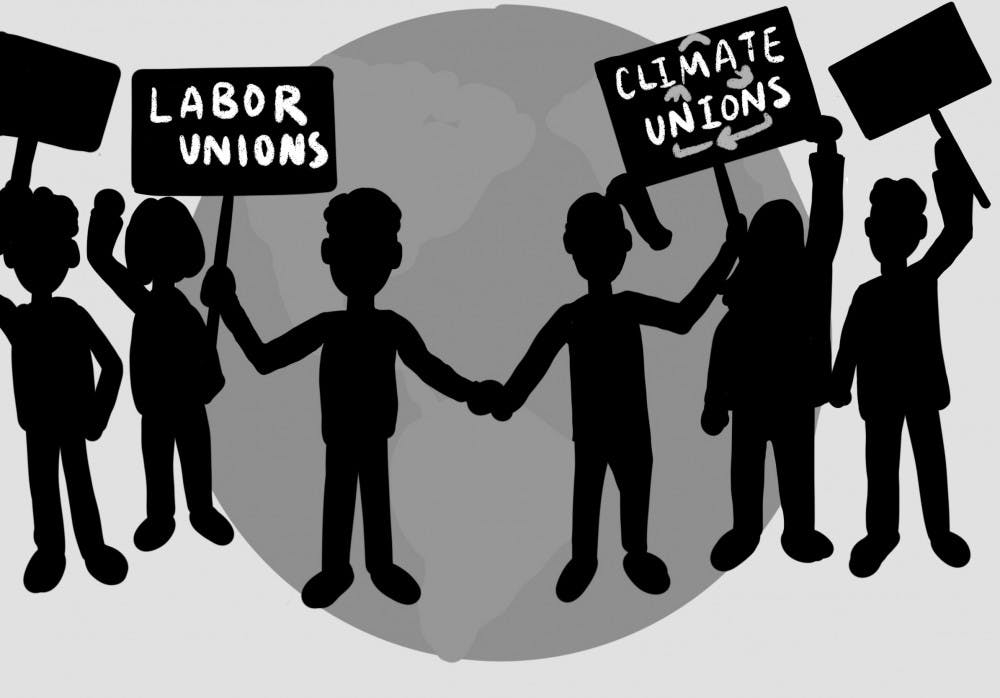As various forces in Rhode Island work toward a more sustainable future, two environmental organizations in the Ocean State have focused on making labor a key player in the transition. The organizations, Renew Rhode Island Coalition and Climate Jobs Rhode Island, both aim to guide state legislators toward fostering an economy that offers more green jobs.
Baylor Fox-Kemper, professor of earth, environmental and planetary sciences, explained that both Renew R.I. and Climate Jobs R.I. share goals of “transitioning away from fossil fuels towards carbon-neutral sources like solar,” as well as reducing carbon emissions from transportation, heating and food production. He also noted that both groups look to reduce emissions to net zero by 2050, and that both value justice and the creation of job opportunities during the transition to renewables.
Monica Huertas, co-chair of Renew R.I., said that one of their main goals is to stop the “whack-a-mole” politics approach to climate solutions. Formed in the early months of 2020, the group focuses on unifying climate change, environmental justice and labor justice in a combined approach, Huertas said. In terms of incorporating labor into the climate action movement , she said “one can’t really work without the other,” emphasizing the importance of cooperation between climate and labor activists. The coalition also strives to give underrepresented groups, especially “Black and brown peoples,” a voice at the policy-making table in the transition to a green economy, she added.
Patrick Crowley, secretary-treasurer for the R.I. American Federation of Labor and Congress of Industrial Organizations, speaking on behalf of Climate Jobs Rhode Island, said his group was founded more recently in early 2021. Climate Jobs, he said, represents an effort to “encourage collaboration between the labor movement and the environmental movement” in pursuing policies that will reduce emissions. Crowley noted that Climate Jobs wants to ensure a “just transition toward a more sustainable economy.” According to Climate Jobs RI, a “Just Transition” entails “a legislative mandate requiring the inclusion of the voices of stakeholders in the labor movement, the environmental movement (and) the racial justice movement, along with voices of private industry.”
Both Huertas and Crowley noted that the recent hurricanes Ida and Henri only further emphasize the importance of their respective organizations’ work.
While each group may share some similarities in missions, the strategies they have adopted differentiate them. The focus of Climate Jobs right now is working with the Climate Jobs National Resource Center and Cornell University to “finalize a report” that they believe will be “a road map for attaining the goals of the Act on Climate,” Crowley said. He cited two recent accomplishments as the hiring of both a lead organizer and a policy researcher to “help grow the organization.”
Fox-Kemper said he “agrees with” Climate Jobs’ “principles that relate to a measurable, scientific approach to reaching net zero emissions by 2050.” He noted that Climate Jobs’ desire to see measurable progress by 2030 was “commendable” as “pre-2030 cuts are just as important as cuts closer to 2050.”
The primary work of Renew RI currently includes focusing on city-designated Green Justice Zones in the Port of Providence, Washington Park and other locations; working to create affordable and sustainable housing available to locals and continuing to grow its “coalition of grassroots organizations,” Huertas said. When speaking on the recent accomplishments of the group, Huertas noted that Renew RI helped to bring “over 600 testifiers” to the state house in the last legislative session to speak on climate-related legislation.
Renew RI is “betting on the Green New Deal” by focusing on jobs, housing and incorporating partners to realize those goals, Fox-Kemper said, which “would drive RI toward a cleaner future.”
When asked about Renew RI, Crowley stated he had insufficient knowledge about the group to comment. Huertas, when asked about Climate Jobs, said they tend to “put band-aids on issues that are quickly wearing off” and characterized Climate Jobs members as “moderates” as she emphasized the need for “radical changes.” Huertas noted that “a sprinkling of justice is not real justice ... and we want justice in its truest form.” She also stated that more moderate reform has made it more challenging to pass the type of legislation Renew RI would like to see.
J. Timmons Roberts, professor of environment and society and sociology, noted that Climate Jobs is “taking a more insider strategy” while Renew RI is more of an “outsider” in terms of their work and lobbying. He concluded that “it’s most effective to have both” since “reforms only happen when there’s a ‘radical flank’” but that “someone needs to propose reforms that can fly.”
Regardless of which group affiliation or lobbying approach Rhode Islanders prefer, Fox-Kemper said that “what we cannot afford to do is nothing, because climate change will collect on that loan from future generations.”





